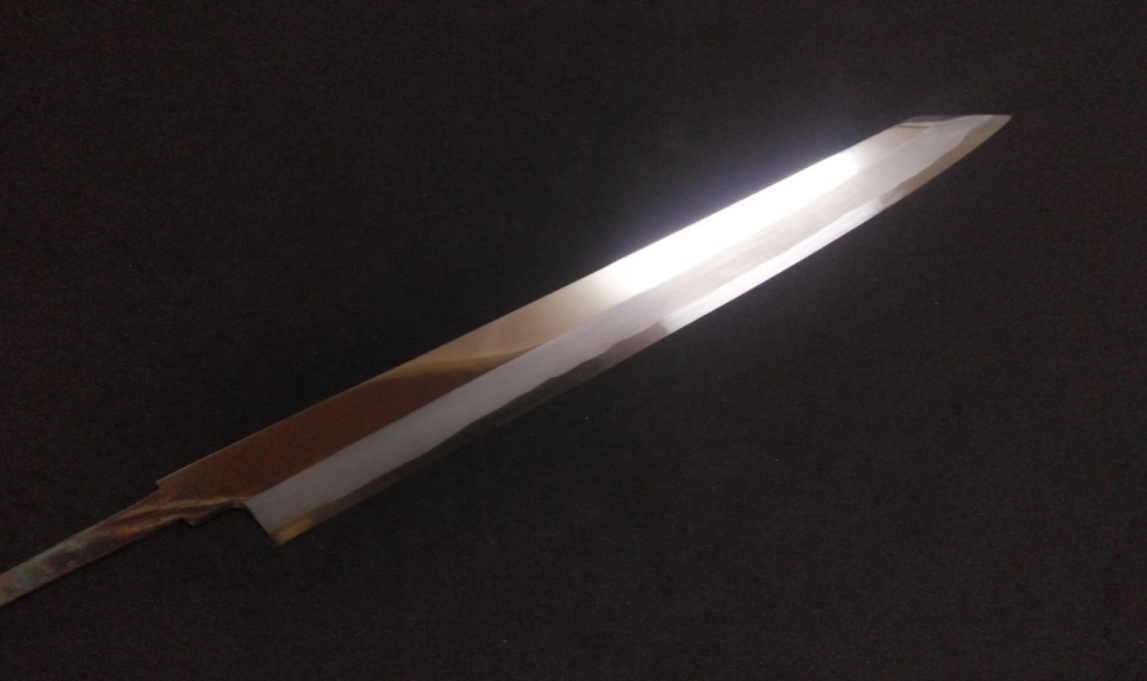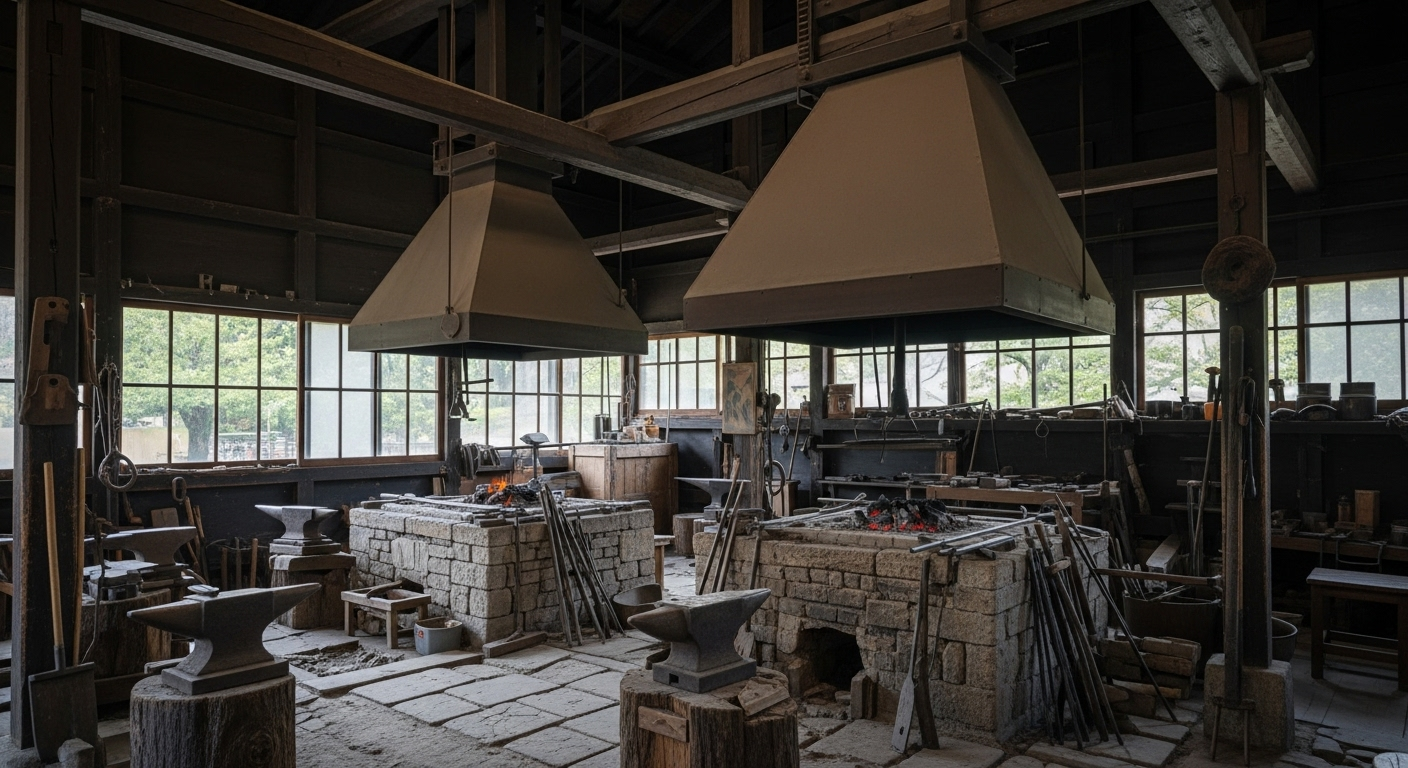
Damascus Steel
-
Beneath every ripple lies a story.
Damascus steel isn't just beautiful—it's a tribute to a lost art, reimagined by modern Japanese craftsmen. Discover how this legendary steel blends ancient spirit with contemporary performance, one breathtaking blade at a time. -
Damascus Steel Knife Collection
-
Ginsan Damascus Yanagiba(Kiritsuke) 270mm -Mirror Polished(both sides)
Regular price $740.00 CADRegular priceUnit price / per$0.00 CADSale price $740.00 CADSold out -
Ginsan Damascus Santoku(Kiritsuke) 180mm-Mirror Polished(both sides)
Regular price $750.00 CADRegular priceUnit price / per$0.00 CADSale price $750.00 CADSold out -
Ginsan Damascus Yanagiba(Sakimaru) 300mm -Mirror Polished(both sides)
Regular price $810.00 CADRegular priceUnit price / per$0.00 CADSale price $810.00 CAD -
Ginsan Damascus Yanagiba (Kiritsuke) 300mm -Mirror Polished(both sides)
Regular price $810.00 CADRegular priceUnit price / per$0.00 CADSale price $810.00 CAD -
Ginsan Damascus Yanagiba(Sakimaru) 400mm-Mirror Polished(both sides)
Regular price $1,180.00 CADRegular priceUnit price / per$0.00 CADSale price $1,180.00 CADSold out
Meet the Traditional Craftsmen Behind the Technique

Forging
Shogo Yamatsuka
A master blacksmith renowned for his exceptional skill in forging Ginsan steel—a rarity in Sakai. Certified as a Traditional Craftsman in 2012, he is trusted by professional chefs for overseeing every step of knife-making, including final sharpening, with unwavering precision.

Sharpening
Tadayoshi Yamatsuka
Certified as a Traditional Craftsman in 2022, Mr. Yamatsuka is highly regarded in Sakai for his exceptional mirror-polishing skills. His beautifully finished blades continue to captivate chefs both in Japan and around the world.
KIREAJI's Three Promises to You
-

1. Forged in the Legacy of Sakai
From Sakai City—Japan’s renowned birthplace of professional kitchen knives—each blade is crafted by master artisans with over six centuries of tradition. Perfectly balanced, enduringly sharp, and exquisitely finished, every cut carries the soul of true craftsmanship.
-

2. Thoughtful Care for Everyday Use
Every knife includes a hand-fitted magnolia saya for safe storage. Upon request, we offer a complimentary Honbazuke final hand sharpening—giving you a precise, ready-to-use edge from day one.
-

3. A Partnership for a Lifetime
A KIREAJI knife is more than a tool—it is a lifelong companion. With our bespoke paid aftercare services, we preserve its edge and beauty, ensuring it remains as precise and dependable as the day it first met your hand.

Why Many Product Photos Show Only the Blade
At KIREAJI, every knife is made to order in Sakai, Japan. Photos show the blade before the handle is attached, allowing artisans to perfect the balance and edge for your specific order. Your knife arrives fully finished — tailored just for you.

Global Delivery from Sakai
Across the world, discerning cooks seek authentic Japanese knives from Sakai — Japan’s legendary knife-making city with over 600 years of tradition.
At KIREAJI, we work alongside master artisans in Sakai to fulfill that desire, shipping genuine handcrafted knives directly from the workshop to kitchens worldwide.
What Is “Damascus Steel”?
-
-
The Truth Behind the Legendary Beauty of Its Wavy Patterns
-
Knives and swords adorned with graceful, flowing wave-like patterns instantly evoke one word: “Damascus steel.” Yet, what many may not realize is that “Damascus” is not the name of a material, but rather the name of a unique pattern itself.
-
Centuries ago, in the ancient city of Damascus (modern-day Syria), master craftsmen worked with a rare and precious steel called Wootz steel. This steel’s special composition naturally created mesmerizing ripple patterns during the forging process. The blades forged from Wootz steel were not only breathtakingly beautiful but also exceptionally strong and resilient—so prized that warriors across the world sought after these legendary weapons. Over time, they became known as “Damascus steel.”
-

However, true Wootz steel is now lost to history. The specific ores and the forging secrets required to recreate it have vanished, making the original Damascus steel an unattainable and mythical material of the past.
-
So, what does “Damascus steel” mean today?
-
Modern artisans recreate the iconic wave patterns by skillfully layering and forging together steels of varying hardness and carbon content. This traditional forging technique is no longer just a method of production but has evolved into a symbol of exquisite craftsmanship and timeless beauty. Every blade tells a unique story, with each pattern as individual as a fingerprint.
-
Today’s Damascus knives are more than mere tools; they are works of art where form meets function. Above all, they carry a silent tribute to a lost legend—a spirit that lives on in every swirl and wave of the blade.
-
By understanding not only the appearance but the deep meaning and history behind these patterns, you can appreciate Damascus steel on a profoundly richer level—as a fusion of heritage and artistry, forged into a single blade.
Features of Damascus Steel
-

Beautiful pattern
Damascus steel is renowned for its distinctive patterns created by layering or folding different types of steel. This process results in a striking pattern throughout the blade, giving it a luxurious and elegant finish.
-

High hardness
The forging process of Damascus steel involves layering various types of steel, which increases its hardness. This technique creates a fine crystalline structure inside the blade, enhancing its strength and durability.
-

Durability
The layering in Damascus steel not only boosts its strength but also its durability. The forging process helps remove impurities and air bubbles, resulting in a blade that is highly resistant to wear and corrosion.
Caring for Your Damascus Knife: Preserving Its Beauty and Performance
-
A Damascus knife is more than just a kitchen tool—it’s a piece of art that elevates the cooking experience. Its stunning layered patterns can spark joy and inspire confidence, turning every meal preparation into something special. Just holding a Damascus knife can make you feel excited or focused, setting the tone for your cooking.
To maintain this beauty and ensure its sharp performance, proper care is essential. By learning the right techniques, you can keep your knife in excellent condition for years to come.
-
Care Instructions After Use
- Wash Immediately
After use, gently clean your knife with a soft sponge and neutral detergent. Leaving dirt on the blade can make it harder to clean and may lead to rust. - Rinse with Hot Water
Pour hot water over the blade to help evaporate moisture. This simple step can reduce the risk of rust forming. - Dry Thoroughly
Use a cloth or paper towel to carefully dry your knife, ensuring no moisture is left behind. A final thorough wipe will enhance its shine.
- Wash Immediately
-

Sharpening Tips
When sharpening your Damascus knife, it’s crucial to protect its beautiful layered pattern. Sharpening the entire blade on a whetstone can make the pattern fade over time.
While this does not affect the knife’s cutting performance, to preserve its appearance, it is recommended to sharpen only the edge. This way, you maintain the knife’s stunning design while keeping its blade sharp and effective.
-
The Joy of Owning a Damascus Knife
A Damascus knife thrives on consistent care. Every small effort you put into maintaining it will keep it shining and performing at its best. There’s something deeply rewarding about taking care of a favorite tool, knowing it will serve you beautifully in return.
-
With proper care, your Damascus knife becomes a partner in your cooking journey, reflecting both its craftsmanship and your attention to detail. Let its unique patterns and razor-sharp edge inspire you to create exceptional meals, time and time again.

FAQ About Damascus Steel

01. Are there any considerations with Damascus steel knives?
While Damascus steel offers outstanding cutting performance and aesthetic appeal, there are a few points to keep in mind:
・Price: Due to the complex forging process and craftsmanship involved, Damascus steel knives are generally more expensive than standard knives.
・Pattern changes with sharpening: Over time, sharpening may cause the surface pattern to appear less pronounced. This does not affect the internal layered structure or performance—it is simply a surface-level change.
With proper care and sharpening techniques, both the beauty and functionality of Damascus steel can be preserved for years to come.
02. Why is the pattern called “Damascus”?
The term “Damascus” refers to the elegant patterns that resemble those seen on ancient blades originating from the Damascus region.
While modern Damascus steel differs from its ancient counterpart, today’s techniques are inspired by the artistry and mystery of these historic blades—blending tradition with modern metallurgical advancements.
03. Where does Damascus steel originate?
The origins of what is now known as Damascus steel trace back to ancient India, where a form of high-carbon steel called Wootz steel was first produced.
This legendary material, prized for its strength and beauty, eventually made its way to the Middle East, where it evolved into what we now admire as Damascus steel.

The Enigmatic Allure of Damascus Steel
With its flowing, water-like patterns and storied past, Damascus steel is more than visual artistry—it delivers remarkable sharpness, resilience, and character that make each knife a functional work of art.

The Soul of Craftsmanship
-
Embracing the Uniqueness of Damascus Knives
A Damascus knife is not just a tool—it is a work of art, forged to be truly one of a kind. The flowing patterns across its blade are born of masterful craftsmanship, ensuring that no two knives are ever alike.
-
This makes each piece a personal treasure, created exclusively for its owner. Beyond its beauty, a Damascus knife becomes a lifelong companion in the kitchen—transforming everyday cooking into a celebration of uniqueness and quality.
-
With every slice, let it remind you: no moment, no dish, and no blade is ever the same.
How Japanese Knives Are Made: The Sakai Tradition
VIDEO PROVIDED: JAPAN TRADITIONAL CRAFTS AOYAMA SQUARE (YOUTUBE)
-
Sakai Forged Blades — Six Centuries of Unrivaled Craftsmanship
Loved by chefs around the world and trusted by 98% of Japan’s top culinary professionals, Sakai knives are more than tools—they are the living legacy of over 600 years of master craftsmanship.
-
At KIREAJI, we work directly with the Shiroyama Knife Workshop in Sakai, Japan, ensuring every blade is hand-forged, finished to perfection, and shipped straight from the workshop to kitchens across the globe. No middlemen. No mass production. Only authentic, artisan-made knives, crafted to elevate your cooking for a lifetime.













